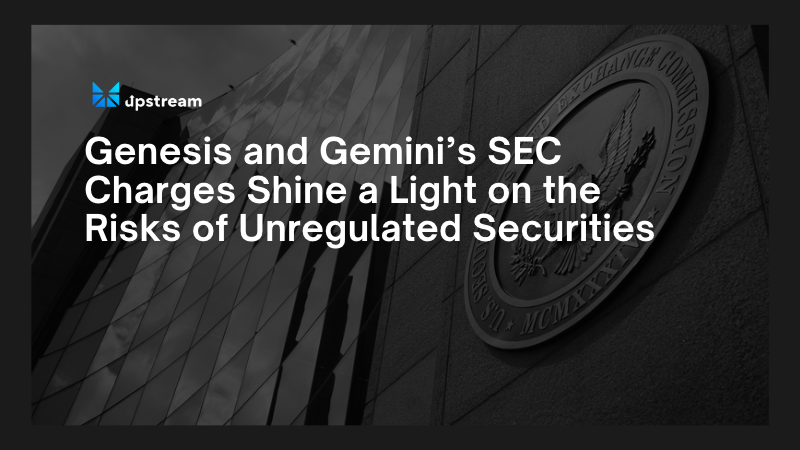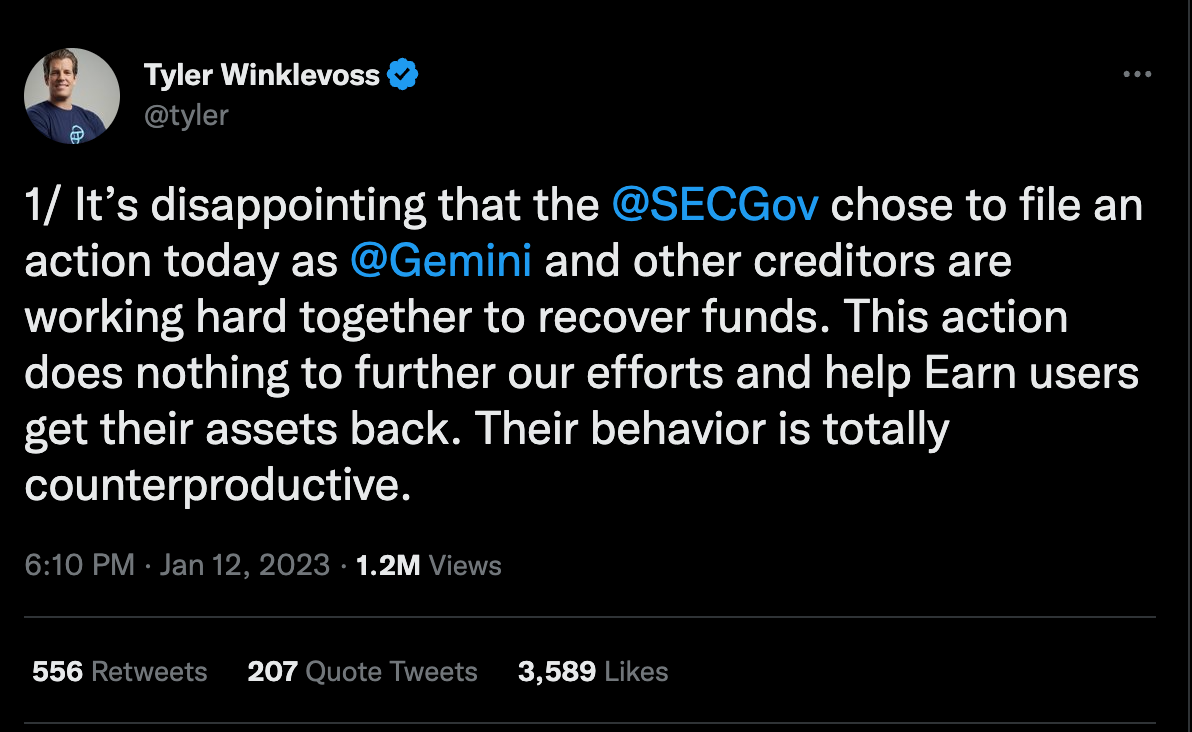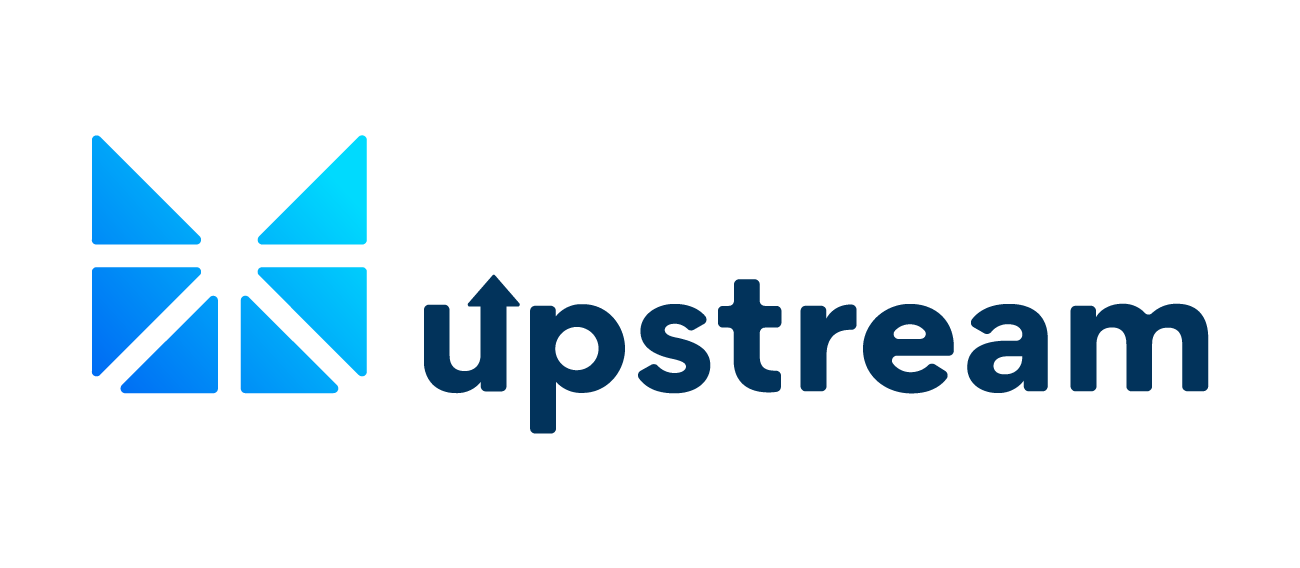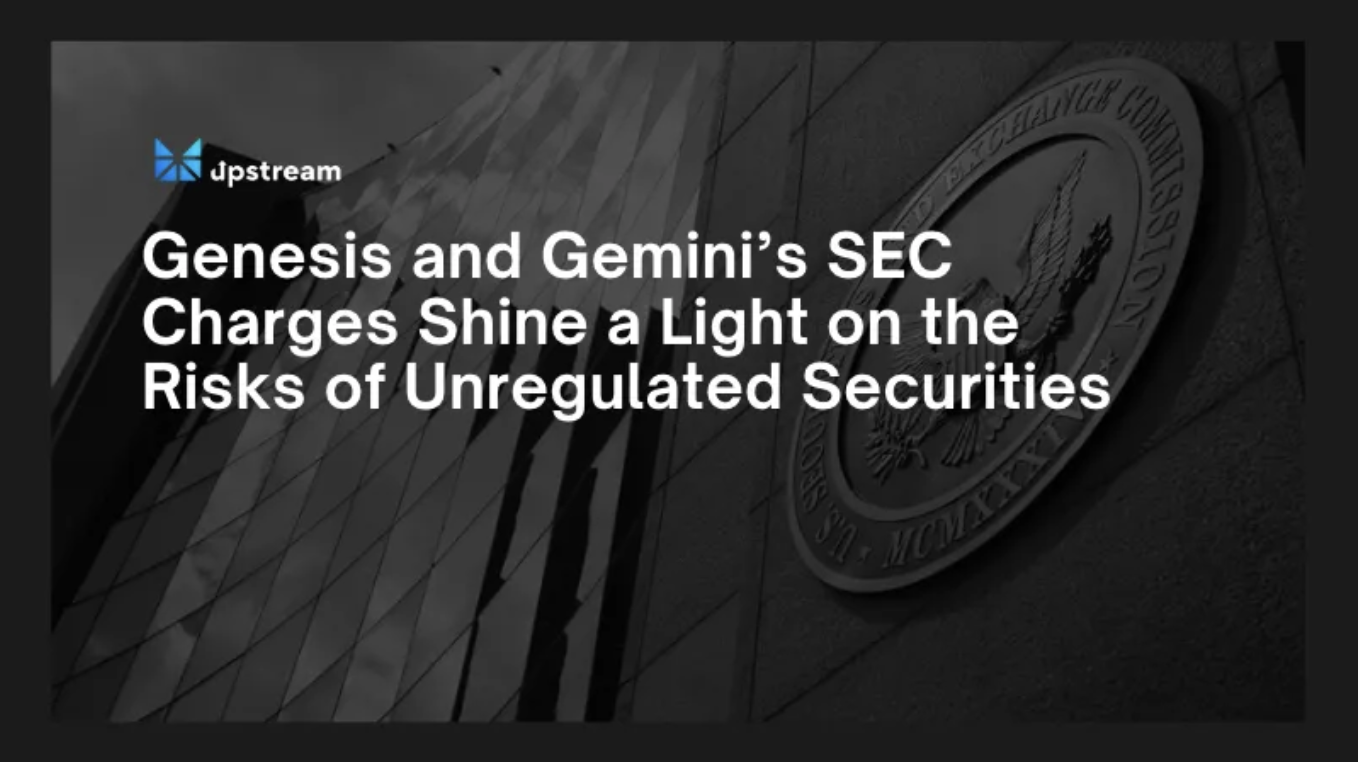
Genesis and Gemini were charged for Unregistered Offers and Sales of Crypto Asset Securities through the Gemini Earn Lending Program
By Anastasia Samaras
Last week, it was reported that through their cryptocurrency loan program, Gemini Earn, Genesis Global Capital, LLC, and Gemini Trust Company, LLC were charged by the Securities and Exchange Commission “SEC” for soliciting and selling unregistered securities to 340,000 retail investors.
“We allege that Genesis and Gemini offered unregistered securities to the public, bypassing disclosure requirements designed to protect investors. Today’s charges build on previous actions to make clear to the marketplace and the investing public that crypto lending platforms and other intermediaries need to comply with our time-tested securities laws. Doing so best protects investors. It promotes trust in markets. It’s not optional. It’s the law.”
– SEC Chair Gary Gensler
Here’s what went down…
According to the SEC, Genesis, a division of the Digital Currency Group that specializes in cryptocurrency lending, and Gemini, a cryptocurrency exchange, joined an agreement in December 2020 to give Genesis’ clients — including American retail investors — the opportunity to lend Genesis their cryptocurrency assets in exchange for the assurance that Genesis will pay interest.
In February 2021, Genesis and Gemini collaborated and launched the ‘Earn’ lending program which pledged clients’ interest of up to 8%. Genesis allocated Gemini users’ cryptocurrency and transferred a portion of the profits to Gemini. The SEC states that Genesis and Gemini raised these profits from investors while failing to register the program under SEC Guidelines.
With FTX’s implosion in November 2022, it ignited a domino effect of exits throughout the cryptocurrency community. Genesis stated it was forced to halt withdrawals due to lack of liquidity and as of January 12th, 2023 has not permitted Earn users to withdraw their funds. As a result, the company ultimately owes 340,000 Gemini Earn investors $900 million.¹
The SEC’s latest actions seemed to have sparked some turmoil, especially with Tyler Winklevoss, co-founder, and CEO of Gemini who addressed the complaint and referred to their behavior as “counterproductive ” and contested the SEC’s decision to submit the charge in a thread on Twitter last Thursday:²

The SEC is investigating several cryptocurrency lenders on the grounds that these interest-bearing accounts are classified as securities. The SEC enforces strict rules regarding the purchase and sale of securities and alleges that Gemini and Genesis did not fully inform investors about the risks involved.
It will be eye-opening to see how the two firms and the crypto market as a whole respond to these crackdowns. Much of the industry is still operating in a legal gray area.
This news and the overall state of the market continue to generate louder calls for clearer regulatory standards for the blockchain industry.
At the end of last year, a national survey from Grayscale, conducted by The Harris Poll on its behalf, found that 81% surveyed agreed there should be clearer cryptocurrency industry regulation.
In the meantime, it would do well for companies to take a proactive approach to stay ahead of compliance.
Upstream’s forward-thinking methodology
Upstream, a MERJ Exchange Market, is the first regulated market for digital securities and NFTs powered by a blockchain. As a neighboring industry player, it’s critical to understand the digital currency sector’s technical challenges and how Upstream’s unique methodology was designed to avert these issues and enforce failsafe.
As a blockchain-powered trading app, Upstream sometimes gets mistakenly looped into the cryptocurrency sector of the greater blockchain industry. We don’t list cryptocurrencies on our market, though we do allow the use of digital currency in the form of USDC stablecoin to invest in tokenized stock or purchase NFTs.
Upstream’s methodology has always tended to achieve a harmonious balance between traditional and digital market structures. We set out to use technologies to optimize compliance, not replace it, which is proving to be paramount.
Here are a few key differentiators Upstream has from cryptocurrency and other blockchain-powered markets:
- FDIC-insured accounts. Upstream is a blockchain-powered stock and NFT market, not a cryptocurrency market. We are a cash-based system with USDC stablecoin as the only cryptocurrency currently accepted. Trading pairs are against USD and customer cash accounts are FDIC-insured up to $250k for all U.S. and non-U.S users. Pairs are traded 1 for 2. To further protect investors, funds can only be sent to and from the account verified during KYC.
- Upstream is a cash-based system. We give our users the unique ability to trade using digital currency in the form of USDC stablecoin, along with credit, debit, PayPal, and traditional bank payments. Trading pairs are quoted, traded, and immediately settled exclusively against the exchanges’ 100% collateralized U.S. dollar stablecoin, backed 1-for-1 with users’ deposits of U.S. Dollar fiat currency. Notably, Upstream does not sell its client order flow.
- Upstream is non-custodial. Traders maintain complete control of their private keys and assets. Upstream never knows a user’s private keys. Conveniently, we hide all the blockchain security and sophistication behind a simple, yet incredibly secure interface. During the KYC onboarding process, we create a “key pair” in an encrypted file that is saved to your Keystore. A Keystore is a way of storing a password-protected file that contains your public and private key, together this makes a key pair. A great way to think about your private key is like a pin code to your ATM card. To transact on Upstream, we make your private key unlockable using your verified biometrics. Every time you transact you sign in using your private key. A timestamp of this record is logged on an Ethereum layer 2 rollup blockchain to maintain a transparent and protected ecosystem.
- Upstream offers Web3 in the world of Web2. Upstream is a true Web3 platform. When users sign up on Upstream they use a password and are known solely by a public blockchain wallet. When KYC is required, data submissions are kept in memory in an auto-expiring cache, never saved to a disk on our servers, and never outsourced to third parties.
- Upstream is a blockchain-powered stock and NFT market, not a cryptocurrency market. As a blockchain-powered market, Upstream features no short selling or other market manipulations enforced by Ethereum blockchain technology. Most cryptocurrency orderbooks and trading systems behind the scenes are database-driven, not blockchain driven. Upstream features best bids and offers openly displayed on a public orderbook, with trades executed on-chain. This is a big deal. Most trading apps only offer windows into an exchange. Upstream offers traders direct access to the exchange with our trading app.
- Necessary Failsafes. There are varying degrees of decentralization when it comes to blockchain-powered markets. Some die-hard crypto enthusiasts are all for complete decentralization, but if the assets you own can be robbed with impunity, what’s it all for? There simply are benefits to having protections in place that leverage traditional financial guardrails. For example, Upstream’s integrated KYC technology enables investors to verify who they are and have their securities returned to them if a private key is lost, stolen, or forgotten. In short, securities are controlled on a user’s smartphone wallet app and are protected by a user’s private key. The technology behind Upstream integrates with a regulated custodian engaged by the securities issuer so that a parallel record of all asset ownership can be maintained by a regulated entity. This way, in exceptional cases, assets can be lawfully restored to their rightful owner by the issuer’s custodian.
Conclusion
More crackdowns of this nature could lead to a drop in U.S. marketplaces which would limit available trading venues, especially for U.S. investors.
Upstream’s trading ecosystem is positioned to lead the next generation of blockchain-powered exchanges. Further, we believe that platforms that are forward-thinking when it comes to the changing regulatory landscape will come out on top.
Join the future of trading at https://upstream.exchange/.
Sources
Disclaimers:
This communication shall not constitute an offer to sell securities or the solicitation of an offer to buy securities in any jurisdiction where such offer or solicitation is not permitted.
Commemorative NFTs are for utility, collection, and display only.
*U.S. investors are not permitted to purchase Upstream listed securities. U.S. and Canadian citizens will only be able to trade in securities they currently own, that have been listed on Upstream, for liquidation purposes only.
If funding Upstream with an ACH or wire bank payment, users must complete Upstream’s in-app KYC process to get their new, FDIC-insured, Upstream U.S. bank account details via email. Users may then initiate a funds-transfer from their bank or financial institution to this new U.S. Dollar bank account. If you haven’t completed KYC yet, or didn’t select ‘Bank’ as the ‘Deposit From’ option when you completed the process initially, then please go through KYC again selecting the ‘Bank’ payment method. Users may complete the simple KYC process by tapping the settings icon and the KYC option inside the Upstream app.
Upstream is a MERJ Exchange market. MERJ Exchange is a licensed Securities Exchange, an affiliate of the World Federation of Exchanges, and a full member of ANNA. MERJ supports global issuers of traditional and digital securities through the entire asset life cycle from issuance to trading, clearing, settlement, and registry. It operates a fair and transparent marketplace in line with international best practices and principles of operations of financial markets. Upstream does not endorse or recommend any public or private securities bought or sold on its app. Upstream does not offer investment advice or recommendations of any kind. All services offered by Upstream are intended for self-directed clients who make their own investment decisions without aid or assistance from Upstream. All customers are subject to the rules and regulations of their jurisdiction. By accessing the site or app, you agreed to be bound by its terms of use and privacy policy. Company and security listings on Upstream are only suitable for investors who are familiar with and willing to accept the high risk associated with speculative investments, often in early and development stage companies. There can be no assurance the valuation of any particular company’s securities is accurate or in agreement with the market or industry comparative valuations. Investors must be able to afford market volatility and afford the loss of their investment. Companies listed on Upstream are subject to significant ongoing corporate obligations including, but not limited to disclosure, filings, and notification requirements, as well as compliance with applicable quantitative and qualitative listing standards.
Forward-Looking Statements
This communication contains “forward-looking statements.” Such statements may be preceded by the words “intends,” “may,” “will,” “plans,” “expects,” “anticipates,” “projects,” “predicts,” “estimates,” “aims,” “believes,” “hopes,” “potential,” or similar words. Forward-looking statements are not guarantees of future performance, are based on certain assumptions, and are subject to various known and unknown risks and uncertainties, many of which are beyond the Company’s control, and cannot be predicted or quantified, and, consequently, actual results may differ materially from those expressed or implied by such forward-looking statements. Such risks and uncertainties include, without limitation, risks and uncertainties associated with (i) difficulties in obtaining financing on commercially reasonable terms; (ii) changes in the size and nature of our competition; (iii) loss of one or more key executives or brand ambassadors; and (iv) changes in legal or regulatory requirements in the markets in which we operate. The Company assumes no obligation to publicly update or revise its forward-looking statements as a result of new information, future events or otherwise’

